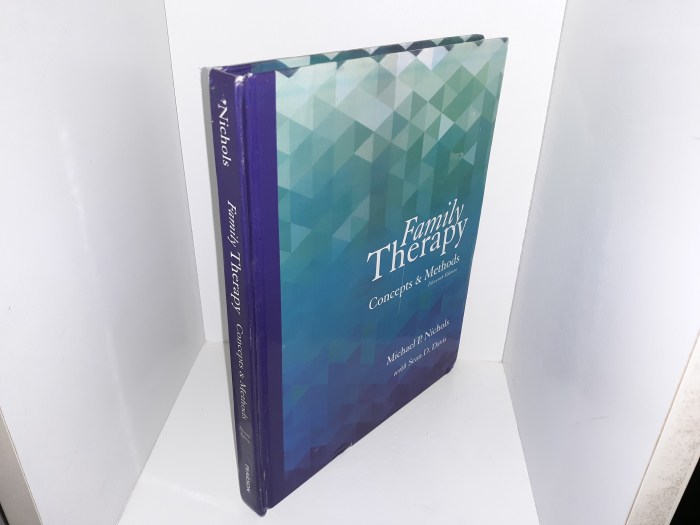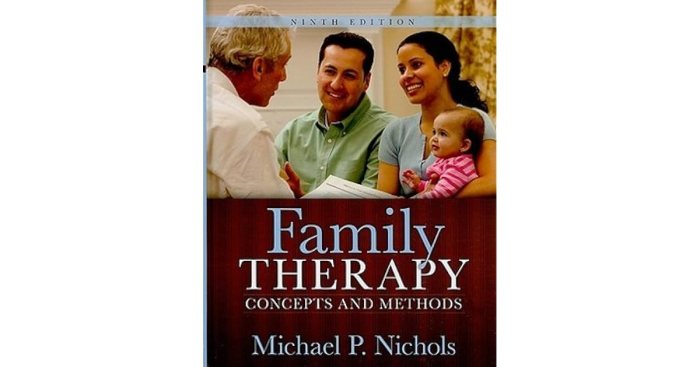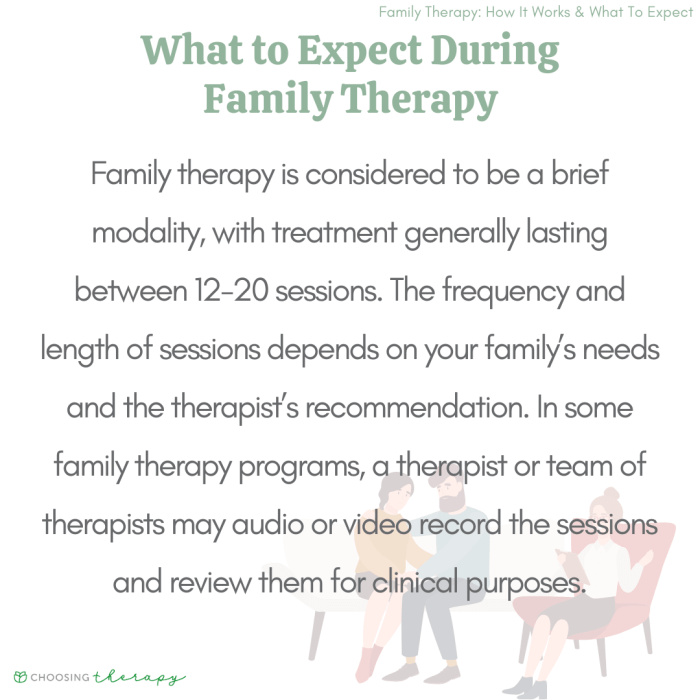Family therapy concepts and methods 12th edition – Family Therapy Concepts and Methods, 12th Edition, delves into the intricacies of family dynamics, providing a comprehensive exploration of the field. This updated edition offers a fresh perspective on the latest advancements and best practices, making it an invaluable resource for therapists and students alike.
From the foundational principles of family therapy to cutting-edge interventions, this book provides a thorough understanding of the complexities of family relationships. It examines the impact of culture, race, and socioeconomic status on family functioning and explores the ethical considerations involved in family therapy.
Introduction to Family Therapy Concepts and Methods 12th Edition
This comprehensive text introduces the key concepts, history, and theoretical orientations of family therapy. It provides a foundation for understanding the complexities of family dynamics and the therapeutic approaches used to address them.
History and Evolution of Family Therapy, Family therapy concepts and methods 12th edition
Family therapy emerged in the mid-20th century, influenced by systems theory, communication theory, and psychoanalytic theory. Early pioneers, such as Murray Bowen and Salvador Minuchin, developed systemic approaches that focused on family interactions and patterns.
Theoretical Orientations in Family Therapy
Different theoretical orientations guide family therapists’ approaches to assessment, diagnosis, and treatment. These include:
- Psychodynamic: Emphasizes unconscious processes, family dynamics, and early childhood experiences.
- Cognitive-behavioral: Focuses on changing maladaptive thoughts, behaviors, and communication patterns.
- Experiential: Uses experiential techniques, such as role-playing and sculpting, to facilitate emotional expression and change.
Assessment and Diagnosis in Family Therapy

Assessment involves gathering information about the family’s history, relationships, and functioning. Tools include:
- Genograms: Visual representations of family relationships and patterns.
- Ecomaps: Diagrams showing the family’s interactions with their environment.
- Family assessments: Structured interviews that assess family dynamics and functioning.
Diagnosis is based on criteria from the Diagnostic and Statistical Manual of Mental Disorders (DSM-5), which classifies mental health disorders that may affect families.
Treatment Planning and Intervention Strategies in Family Therapy

Treatment plans Artikel goals, interventions, and a timeline. Interventions include:
- Communication training: Improving communication skills to enhance understanding and reduce conflict.
- Problem-solving: Teaching families how to identify and solve problems effectively.
- Conflict resolution: Facilitating healthy conflict management and negotiation skills.
Evidence-based practices in family therapy include cognitive-behavioral therapy, systemic therapy, and solution-focused therapy.
Special Topics in Family Therapy
Family therapy addresses unique challenges and considerations in working with diverse families:
Culture, Race, and Ethnicity
Therapists consider cultural factors, values, and beliefs that influence family dynamics and treatment approaches.
Socioeconomic Status
Socioeconomic factors, such as poverty and discrimination, can impact family relationships and mental health.
Ethical Issues
Family therapists adhere to ethical principles, including confidentiality, informed consent, and avoiding dual relationships.
Specific Mental Health Disorders
Family therapy plays a role in addressing mental health disorders, such as depression, anxiety, and substance abuse, within the family context.
Research and Evaluation in Family Therapy: Family Therapy Concepts And Methods 12th Edition

Research supports the effectiveness of family therapy. Key findings include:
- Family therapy is effective in treating a wide range of mental health disorders.
- Different theoretical orientations can be effective, depending on the specific family and problem.
- Family therapy can improve family relationships and functioning.
Challenges in family therapy research include the complexity of family dynamics and the difficulty in isolating the effects of specific interventions.
Applications of Family Therapy in Different Settings
Family therapy is used in various settings:
Private Practice
Family therapists work with families in private offices or clinics.
Community Mental Health Centers
Family therapy is offered as part of comprehensive mental health services.
Schools
Family therapists collaborate with school staff to address family-related issues that impact student behavior and well-being.
Family therapy promotes family well-being and prevents mental health problems by:
- Improving communication and problem-solving skills.
- Reducing conflict and increasing support.
- Enhancing family resilience and coping mechanisms.
FAQ Summary
What are the key principles of family therapy?
Family therapy is based on the principles of systems theory, which views the family as an interconnected system where each member’s behavior affects the others. Therapists focus on improving communication, problem-solving, and conflict resolution within the family unit.
How is family therapy used to treat mental health disorders?
Family therapy can be used to treat a wide range of mental health disorders, including depression, anxiety, and substance abuse. By addressing the underlying family dynamics that contribute to these disorders, therapy can help improve individual and family outcomes.